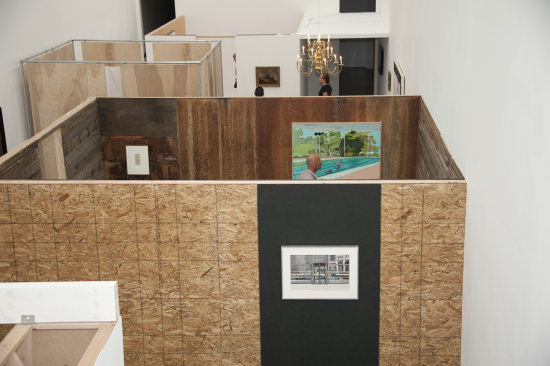
Forget “home is where the heart is.” Home is where the art is—or so argues the latest show from the El Segundo Museum of Art (ESMoA). HOME isn’t your typical art exhibition, just as ESMoA isn’t your typical art museum. (In fact, ESMoA prefers the terms “experience” and “laboratory,” respectively. ) The experience, which runs through February 1, 2015, invites visitors to re-evaluate their personal definitions of art, the home, and—most especially—art in the home.
On the one hand, HOME offers a tutorial in creative collection.”It’s a little bit about the home being the first place people take art, decide to live with art and look at it in daily life,” said curator Bernhard Zuenkeler. On the other hand, the experience suggests that art has the power to transform the spaces it occupies, and the people who adopt it.
HOME is constructed as a series of rooms, each correlated to an area of the home, and each furnished with fixtures, wall coverings, and flooring. “We of course love to play with stuff, a big museum couldn’t do that,” said Zuenkeler, pointing out the crocodile-green floor in the “living room.” “We have things that are not, from an art-historical point of view, totally correct. But we show that when you put art in your home, pieces always talk to one another—it’s impossible to have a vacuum.” Juxtaposition—of, say, works by Golden Age artists and Los Angeles up-and-comers—is a theme of the show, intended to convey the productive power of difference.
Most of the artwork featured in HOME deals with home, or architecture, on some level. Jan van Goyen’s painting of a 17th-century tavern is accompanied by work by Bernd and Hilla Becher, also depicting houses. Other works, like a conceptual piece by Flora Kao, point to the collapse of the American dream. In the show’s log-cabin room, its walls covered in rough timber, a painting by Max Liebermann suggests a desire to escape the confines of home.
Home security (and, more broadly, homeland security) is another motif. Cole Sternberg‘s reclaimed shooting targets occupy the entrance, near which stands a Honda CB750 motorcycle. “It’s now a total classic,” remarked Zuenkeler of the bike first manufactured in 1969. “But visitors today forget that when it was introduced, this motorcycle was a threat to the entire American industry. People at that time were totally afraid of the Japanese. Sometimes you have to trust what you let into the home.”
ESMoA’s HOME acknowledges what Zuenkeler said too many art-world denizens are unwilling to admit. “For a lot of people who are not used to art, the question is: ‘do I want to live with this piece of art?'” he said. “Often it starts with, ‘Does this piece of art match my sofa?'” HOME offers an alternative path to building a personal art collection, said Zuenkeler, one that challenges the conventions of both museum curation and DIY home decoration. “I would rather say, ‘Get the sofa redone according to your art.'”